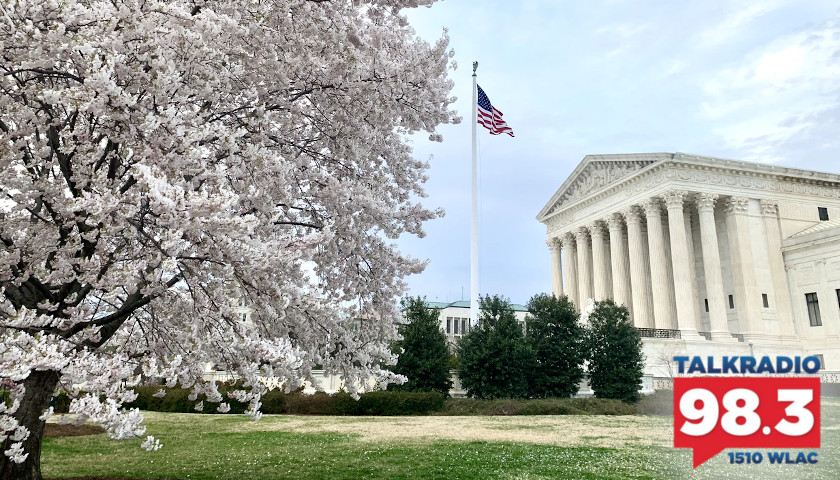Live from Music Row Wednesday morning on The Tennessee Star Report with Michael Patrick Leahy – broadcast on Nashville’s Talk Radio 98.3 and 1510 WLAC weekdays from 5:00 a.m. to 8:00 a.m. – host Leahy welcomed the original all-star panelist Crom Carmichael to the studio
Leahy: In studio, the original all-star panelist, Crom Carmichael. Crom, I want to get back to that Supreme Court discussion. First, I’ve got a little bit of a curveball.
Carmichael: Sure. Yes.
Leahy: I’m going to throw you a curveball. Federal prosecutors indicated on Tuesday they will drop the charges against the former president of Pilot Flying J, Mark Hazelwood, and two other employees. Did you know that?
Carmichael: Wait, I’m sorry.
Leahy: Federal prosecutors indicated on Tuesday they will drop the charges against the former president of Pilot Flying J, Mark Hazelwood, and two other employees. They were convicted in this sort of kickback scheme and it was overturned in an appeals court. And now the federal prosecutors are going to drop the charges.
Carmichael: That’s local because Pilot and Flying J have been merged.
Leahy: Yeah, it’s over.
Carmichael: So they won in the appeals. These people …
Leahy: They were convicted.
Carmichael: And then the conviction was overturned.
Leahy: In appeals on a two-to-one decision. Now the federal prosecutors have said we’re going to drop the charges. It’s an interesting story.
Carmichael: I haven’t followed that enough to be able to make any kind of comment.
Leahy: Well, I’m not making any comment other than noticing that development because our listeners are interested because Pilot Flying J is a big company. And of course, the Haslam family owns it.
Carmichael: And very successful.
Leahy: A very successful company.
Carmichael: I buy a lot of my fuels and snacks on the interstates from either Pilot Flying J.
Leahy: (Chuckles) There you go.
Carmichael: But to continue on the Supreme Court thing, Kimberley Strassel goes on to point out that Justice Breyer is very aware. This is interesting to me. Chief Justice John Roberts, is constantly fretting over the Democrat Party’s efforts to undermine the court’s legitimacy and is therefore always in search of a unanimous or near-unanimous opinion.
In order to get a unanimous or near-unanimous opinion, you have to water down your opinion. And so Breyer is now, as the senior liberal, is in a better position to get what he wants in an opinion in that he will say, alright, I will agree with the majority, if you reshape the final opinion this way.
Now, this will be interesting. Let’s use this Mississippi abortion case as an example. This one will be almost impossible if the so-called conservatives on the court believe that the state of Mississippi has the right to determine when life begins. And essentially, whether or not the states have rights or whether or not it’s a national law that has to apply everywhere.
Breyer won’t be able to influence that decision. That’s why decisions sometimes end up five, four, or six, three. In the court today, it would be a six, three. But Breyer does try. And the percentage of cases that end up in nine nothing or eight one is more than 50 percent. They take about 70 cases a year.
Leahy: And so probably maybe 10 of them are controversial. 10 or 15, yeah. By the way, you mentioned that case from the state of Mississippi in which the court will look at the precedent established by the Roe v. Wade case on abortion.
Our lead story at The Tennessee Star, a group called the Constitutional Government Defense Fund joined 22 other state family policy organizations, including the Family Action Council of Tennessee, and filed an amicus brief in that case. And former state Senator David Fowler is with the Family Action Council here in Tennessee.
Carmichael: The way the left portrays these types of court decisions is, they say, overturning Roe v. Wade, they claim would end the right to abortion. And that is false.
If this case were to – if the Supreme Court ruled in favor of Mississippi in this case, then the law in Mississippi that had been passed by the Mississippi legislature assigned by the government would be effective in the state of Mississippi. It wouldn’t be effective in California or New York or any other state for that matter.
Leahy: Exactly.
Carmichael: But what it would do is it would mean that in states, for example, I believe, and so correct me if I’m wrong. Here in Tennessee, we have passed a Heartbeat Bill or something. That is where once a heartbeat is detected –
Leahy: I think the courts have overturned that. But let me add just one little caveat here. It doesn’t surprise me, but it’s another long, long, long list of disappointments with Chief Justice Roberts.
I believe that the state that – what Kimberley Strassel wrote in that report – that Chief Justice Roberts is fretting over the Democratic Party’s constant attacks on the legitimacy of the court,
I think it’s exactly true. I think that explains his posture on this. This is why he basically made the wrong decision in NFIB v. Sebelius, which basically gave Obamacare the blessing of the Supreme Court way back in 2012. He’s been doing that kind of juxtaposition for years, and I don’t like it.
Carmichael: I think your assessment is correct. And I think Kimberley Strassel points out that even the Supreme Court is still political.
Leahy: And Chief Justice Roberts is very concerned.
Carmichael: They’re humans. They’re all humans.
Leahy: The chief justice is very concerned that I don’t like his approach here. (Carmichael laughs)
Listen to the full third hour here:
– – –
Tune in weekdays from 5:00 – 8:00 a.m. to the Tennessee Star Report with Michael Patrick Leahy on Talk Radio 98.3 FM WLAC 1510. Listen online at iHeart Radio.





